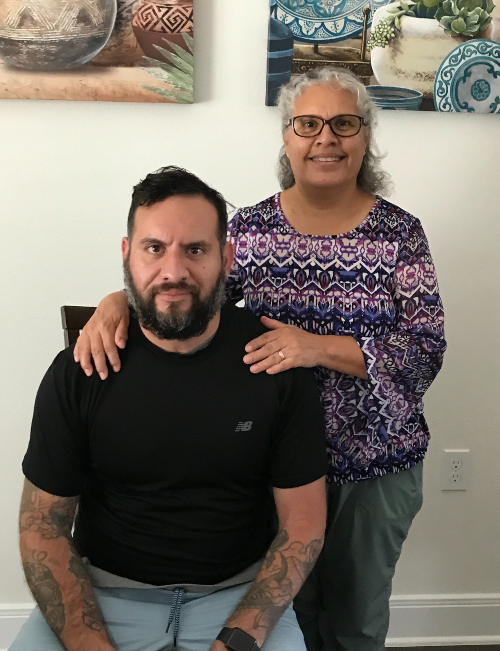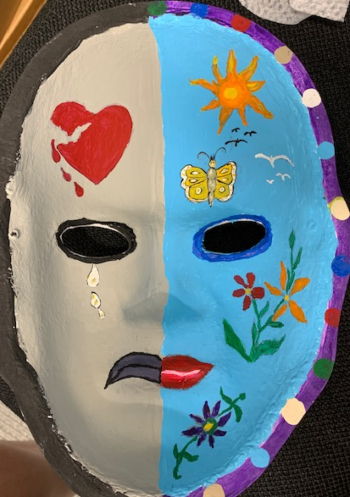Military Caregiver Finds Support for Son and Herself with Wounded Warrior Project

Evelia Ruiz had to learn quickly about traumatic brain injury (TBI), the VA system, and physical therapy and rehabilitation while helping her son Freddy recover from severe combat wounds.
It all happened fast and relentlessly, from the time the terrible phone call came that her son was injured in Afghanistan, to his transport via Germany to Walter Reed National Military Medical Center in Bethesda, Maryland.
Freddy enlisted in the Army in 2004, after high school, and deployed twice to Iraq before his Afghanistan assignment. His unit protected Army personnel and ran convoys, mostly at night to avoid enemy confrontation.
The night of his injury, Freddy was driving the first Humvee, which transported another seven soldiers. As the driver, Freddy was the only one required to wear a seat belt.
The vehicle was rammed by a suicide car bomb, tossing the Humvee in the air. The other seven soldiers were ejected. Freddy was the only survivor.
“When they first called us, they were trying to move him to Germany to stabilize him and see how he responded to treatment,” Evelia recalled. The anguished parents were asked to wait eight hours, which became 12 hours. “It was an eternal wait for a mother, but I knew he was alive, and when there’s life, there’s hope.”
The Hardest Thing a Mother Can See
From the time Evelia knew her son had signed up with the Army, she felt an internal conflict that many military mothers describe.
“I felt proud of Freddy’s service to his country, but at the same time, I felt this deep sense that I might lose my son,” Evelia said.
On the way to Walter Reed, the Army liaison told Freddy’s parents that he’d broken bones all over his body and that the helmet he was wearing had broken in pieces. But seeing Freddy in a hospital bed at Walter Reed was “the hardest thing a mother can see,” Evelia said.
She remembers the bandages, tubes, and drains attached to her son’s wounded body — she could only see his fingers.
“I knelt beside the bed, and I said to him, ‘we’re here,’” Evelia recalled. “He was not recognizable.”
It was four months before Freddy could communicate again, and it took him longer to move and walk.
A Voice for My Son
Ever since Freddy’s arrival at Walter Reed for treatment and intense physical therapy, Evelia, who grew up in Mexico and migrated to the U.S. as an adult, was practicing English so she could speak for him.
“I became an advocate for my son, and I told myself, ‘I’m going to be his voice,’” Evelia said.
She left her job in a public school cafeteria in Dallas, and Freddy’s dad Cruz interrupted his own physical therapy after a stroke, to be with their son day and night.
And that was just the beginning. Over the next 10 years, Evelia and her husband Cruz left their home in Dallas to spend a year in Maryland and then relocated to San Antonio, where the VA has facilities to assist soldiers with injuries as severe as Freddy’s.
Evelia has celebrated every step, big or small, that her son Jose Alfredo (Freddy) Ruiz has taken since birth, but more poignantly since his injuries in 2010 put him in a coma for two months and on physical rehab for life.
Evelia provided the structure for Freddy to achieve small milestones on the road to a more independent life.
“I gave him small, specific things to do to motivate him,” Evelia said. She would place a small bench nearby so Freddy could put on his socks and shoes. Even small tasks marked significant progress in Freddy’s recovery and independence.
A Leap Toward Healing
A big leap happened when a VA social worker told Evelia about Wounded Warrior Project® (WWP) and its Independence Program. Evelia and Freddy enrolled in the program in 2012.

The Independence Program provides long-term support to the most seriously injured warriors living with wounds such as moderate to severe brain and spinal cord injury or neurological conditions that impact independence. The program helps veterans like Freddy take steps toward a more independent life.
Because every journey is different, WWP and its partners work as a team with each warrior, their family members, and their caregivers to set goals to live a fulfilling life. Each warrior and caregiver receive individualized services that allow wounded veterans to progress toward goals. Caregivers can feel they have a team behind them.
Based on Freddy’s and Evelia’s specific needs, community-based professionals support them with fitness and nutrition education, social enrichment activities, stress management, and resiliency training.
Injured warriors and families also have access to alternative therapies such as art therapy. Evelia participated in a virtual exercise that helped her share her feelings through a mask art project. The mask was a metaphor for going beyond the outward projection and discussing how she felt inside.
“With the mask project, I was able to express my life,” Evelia explained. “The monotone part of the mask represents the loss of my son’s former self, and the bright part of the mask is the joy of still having him here and learning to live day to day with the son I have now.”
The Road Ahead
Freddy has a long road to travel. Evelia worries about the long-term impacts of his brain injury and his mental well-being. But thanks to help from WWP, Evelia knows she has people supporting her and her son.
“I’m deeply thankful for the support from Wounded Warrior Project because it makes me feel like I’m not alone,” Evelia said. “It’s good to be able to express my feelings and to hope my experience helps other caregivers know that they’re not alone.”
Evelia hopes people accept Freddy and understand how TBI might change his behavior, but not his essence and his sacrifice.
“I have strived to get to know my son and his condition, and to read his face for answers to how he feels each day.” She shares that it’s hard to watch people misinterpret his reactions and shy away from talking to him. “It’s difficult for people with limitations to feel accepted.”
Evelia uses a whiteboard with emojis to help Freddy express his daily state of mind. She keeps things in perspective and focuses on the positive to keep her spirits up.
“It’s important not to take things personally when my son becomes frustrated,” Evelia said. “We want him to know that we love him and accept him the way he is today.”
The love and support of his family are essential parts of Freddy’s rehab. WWP honors that bond and empowers caregivers like Evelia to move forward knowing they are supported and appreciated.
“For me, taking care of my son is a blessing from God, and I do it with all my love,” Evelia said.
Learn more about the hope WWP offers seriously injured warriors and their caregivers.
About Wounded Warrior Project
Since 2003, Wounded Warrior Project® (WWP) has been meeting the growing needs of warriors, their families, and caregivers — helping them achieve their highest ambition. Learn more.